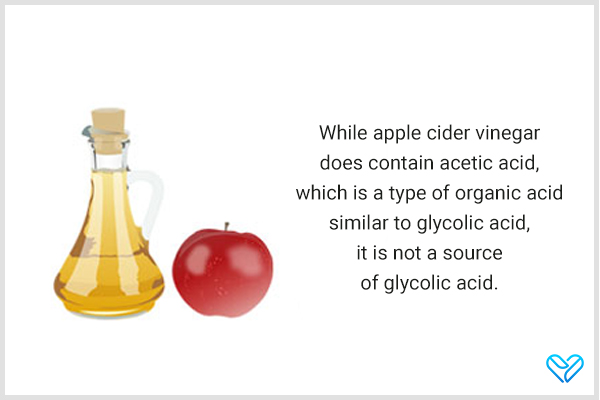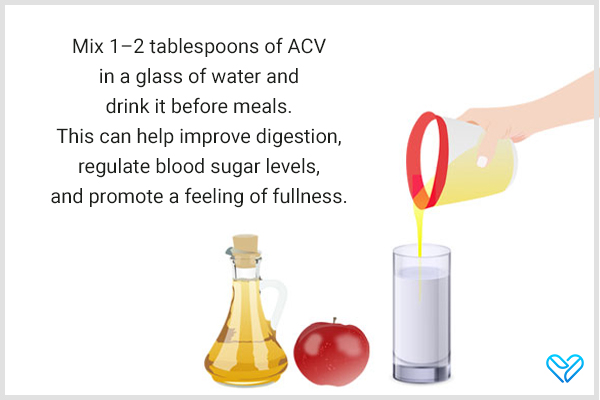In this article:
Glycolic acid, a type of fruit acid and alpha-hydroxy acid (AHA), is found in apples and some citrus fruits, because of which a lot of people may think that apple cider vinegar (ACV) can be a source of glycolic acid, but it is not true. (1)(2)

Another reason why people might think glycolic acid is present in ACV is because glycolic acid is also known as hydroxyacetic acid and ACV is a rich source of acetic acid. However, forming glycolic acid from acetic acid involves hydroxylation of the methyl group in acetic acid, which requires technical and chemical processes that can’t be performed at home. (3)
Hence, it is safe to say that ACV is not a very good source of glycolic acid, although it is a rich source of a lot of other fruit acids and AHAs such as citric acid, malic acid, and acetic acid. (2)
Read on to learn more about glycolic acid and ACV.
Apple Cider Vinegar and Glycolic Acid
Apple cider vinegar
Apple cider vinegar (ACV) is a popular home remedy that has been used for various health and beauty purposes for centuries. It is made by fermenting apple juice with yeast and bacteria, which convert the natural sugars in the juice into alcohol and then acetic acid.
ACV has a high concentration of acetic acid, which gives it its characteristic sour taste and pungent smell. (4)
Glycolic acid
Glycolic acid is a type of alpha-hydroxy acid (AHA) that is commonly found in chemical peels, skin care products, and exfoliating treatments. It is derived from sugar cane and other fruits and has the smallest molecular size of all the AHAs, allowing it to penetrate deeply into the skin and exfoliate the surface layers.
Glycolic acid has been shown to have numerous skin benefits, including increasing cell turnover, reducing the appearance of fine lines and wrinkles, improving skin texture and tone, and treating acne and hyperpigmentation. (1)(5)(6)
Note: Despite its many benefits, glycolic acid can be harsh on the skin and cause irritation, especially in higher concentrations. Some people may also be sensitive or allergic to glycolic acid and experience adverse reactions such as redness, itching, or burning. (1)
Is Apple Cider Vinegar High in Glycolic Acid?

The answer is no. While ACV does contain acetic acid, which is a type of organic acid similar to glycolic acid, it is not a source of glycolic acid.
The main difference between acetic acid and glycolic acid is their molecular structure and properties.
Acetic acid has a simple molecular structure, with just two carbon atoms and two oxygen atoms, while glycolic acid has a more complex structure, with a larger chain of carbon and oxygen atoms. This structural difference also leads to differences in their chemical properties and effects on the skin. (7)(1)
Is ACV Good for You Even if It Lacks Glycolic Acid?
In addition to acetic acid, ACV also contains other beneficial compounds such as vitamins, minerals, and antioxidants. These nutrients can help to nourish and protect the skin and may also have anti-inflammatory and antibacterial properties.
Some people use diluted ACV as a natural toner or facial cleanser. It is also good for overall health as it helps in weight loss, lowers blood glucose levels, and reduces the risk of heart diseases. (8)(9)
How to Consume Apple Cider Vinegar for Health?
ACV can be consumed in several ways to reap its health benefits. Here are some popular methods:

- Dilute it in water: Mix 1–2 tablespoons of ACV in a glass of water and drink it before meals. This can help improve digestion, regulate blood sugar levels, and promote a feeling of fullness.
- Use it in salad dressings: ACV can add a tangy flavor to your salad dressings. Mix it with olive oil, lemon juice, honey, and mustard for a healthy and delicious dressing.
- Add it to marinades: ACV can be used as a base for marinades to tenderize meat and enhance its flavor.
- Take it as a shot: For a quick and easy way to consume ACV, take a tablespoon of it as a shot followed by a glass of water.
Note: It’s important to note that undiluted ACV can be harsh on your teeth and throat, so it’s best to dilute it before consuming.
Can Acetic Acid Cause Cancer?
The link between acetic acid and cancer in humans is currently unknown, and research conducted on animals and cell lines has not shown any evidence of a correlation with cancer or birth defects. (10)
Final Word
While apple cider vinegar does contain acetic acid and other AHAs and fruit acids, it is not a source of glycolic acid. However, apple cider vinegar can still be a useful ingredient in skin care and healthcare routines, as long as it is used in moderation and properly diluted.
- Was this article helpful?
- YES, THANKS!NOT REALLY


